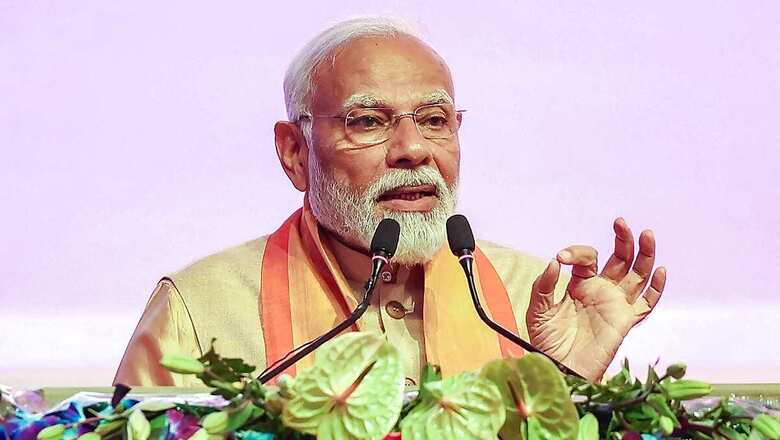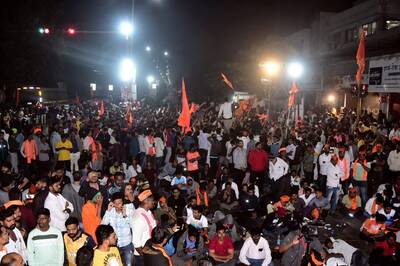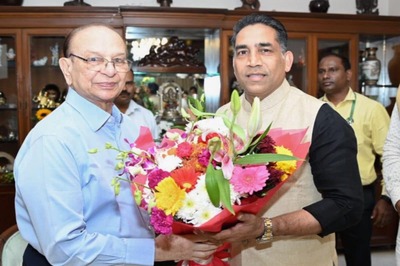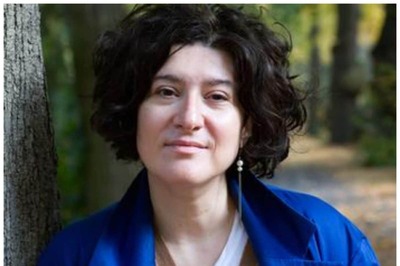
views
In the chilly winters of 2013, the grounds of MA Stadium in Jammu bore witness to a spectacle that would echo through the corridors of power for years to come.
Narendra Modi, then the chief minister of Gujarat and the BJP’s prime ministerial candidate, descended upon the stadium with a roar that set the stage for the party’s grand return to dominance in the 2014 general elections. It was a ‘Lalkar Rally’, a clarion call that reverberated through the political landscape.
Modi, the master orator, didn’t merely speak; he roared. His words cut through the political rhetoric that had muddled the issues of Jammu and Kashmir for seven decades. The crowd, a sea of eager faces, hung on to his every word, as he unravelled the complex tapestry of emotions woven into the erstwhile state’s history.
The central theme, the heart of Modi’s address, was the contentious Article 370. He spoke of its role as the catalyst for separatism, a menace that needed to be uprooted for the sake of unity. The promise was bold — if the BJP, under Modi’s leadership, secured an absolute majority, Article 370 would be history. It was a declaration that resonated not only with the people present in the stadium but with the entire nation.
Modi’s narrative didn’t stop there. He delved into the predicament of thousands of West Pakistan refugees, living in Jammu and Kashmir, yet denied basic citizenship rights. The irony of their ability to elect the prime minister while being unable to choose their ward members was a poignant highlight. Modi pledged an end to this discrimination, a promise that lingered in the hearts of the masses.
The spectre of Pakistan-sponsored terrorism loomed large in Modi’s discourse. He accused the weak government at the Centre of turning a blind eye to the menace. The remedy, according to him, lay in teaching Pakistan a lesson, a lesson that would deter any future misadventures across the border.
The issue of a few influential families wielding power in Jammu and Kashmir didn’t escape Modi’s scrutiny. He vowed that funds sent from the Centre for the state’s development would no longer be siphoned off by these families. It was a commitment to ensure that the people of Jammu and Kashmir would directly benefit from the resources allocated for their progress.
Fast forward a decade, and Modi returns to the same MA Stadium, not as a candidate but as the leader who fulfilled many of those promises. Article 370 and 35 A lie revoked, and the long-neglected West Pakistanis and Valmikis have finally found a place as equal citizens.
The once-volatile Line of Control now enjoys a semblance of peace after a stern response to provocations, including surgical strikes and Balakot air raids. The separatist narrative, epitomised by the now-defunct Hurriyat Conference, has crumbled. Stone-pelting, once a symbol of unrest, is a relic of the past. The killings of civilians and security forces due to terrorism have plummeted by over 75 per cent.
The economic resurgence in Kashmir is hard to ignore. Strikes, once a daily routine dictated by separatists, are now a distant memory. The once-blackmailed Centre now faces demands for statehood and assembly elections.
Modi’s vision for Jammu and Kashmir encompasses more than just political milestones. The region is now on a trajectory of rapid development, with AIIMS, IITs, IIMs, IIMCs, mega road projects, and enhanced railway connectivity. Dr Jitendra Singh emphasises that fulfilling promises is just the beginning; the focus is now on elevating Jammu and Kashmir to the standards of other developed states.
As PM Modi inaugurates over 200 projects worth Rs 30,000 crore, the transformation is palpable. From the bustling Lal Chowk to the serene Jhelum River front, the promises echo in every corner. The nightlife in Srinagar is no longer confined to homes, and the young generation revels in newfound avenues, including the first multiplexes and cinema halls.
Tourists flock to Jammu and Kashmir, including the successful G20 event that showcased the region’s shift from a terror hotspot to a tourism hub. Modi’s call to replace stones with laptops has not fallen on deaf ears. The youth, once notorious for stone-pelting, are now leading in the IT sector, realising dreams that seemed distant a decade ago.
The iron fist against terrorism promised in the Lalkar Rally is evident. Hard-core terrorists have been eliminated, and terror outfits banned by the Union Home Ministry. The BJP, once considered politically untouchable in the Kashmir valley, boasts over five lakh members, with a significant presence in local body elections.
As we reflect on this decade of roars and resurgence, it’s clear that PM Modi’s leadership has left an indelible mark on Jammu and Kashmir. The promises made a decade ago have not only been fulfilled but have laid the foundation for a new era in the region’s history. The Modi saga continues, and Jammu and Kashmir stands testament to the transformative power of political will.




















Comments
0 comment